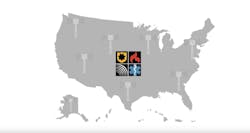FirstNet Efforts Slowly Picking Up Steam
A dedicated wireless communications network for first responders answering the call on a large-scale incident is something most citizens might assume is already in place across the country.
The unfortunate truth is that they would be wrong, but efforts are ongoing to present all 50 states with plans and options surrounding The First Responder Network Authority (FirstNet), which was designed to help public safety agencies coordinate their efforts amid emergencies and major events such as earthquakes, hurricanes, floods or terror attacks, to name just a few scenarios.
FirstNet is an independent authority established by Congress comprised of officials from the public safety, government, technology, finance and wireless sectors. In partnership with AT&T, the aim is to design and implement tools for fire, police, EMS and other emergency services to share data during significant events. The ultimate goal is to implement the first high-speed public safety broadband network in all 50 states, the five U.S. territories and the District of Columbia. Both cities and rural communities stand to benefit from the superior level of data communication.
"FirstNet's job is to establish a network that offers incredible value to users," Mike Worrell, FirstNet Senior Fire Services Advisor, wrote in a 2016 exclusive for Firehouse. "If we provide a compelling network that does what it should, we believe public safety users will adopt the FirstNet network and come to rely upon the network for their mission critical needs."
One of the details surrounding FirstNet that the International Association of Fire Fighters (IAFF) is stressing when reaching out to governors and local fire officials is that it does not currently provide mission-critical voice capability, but part of it's mandate is to improve and strengthen legacy systems. Although push-to-talk functionality is now available with FirstNet, protection for existing mission-critical systems is something the IAFF is urging governors to closely examine when working with vendors on their state's communications needs -- whether or not they opt in on FirstNet.
"It's our belief and what we're encouraging the governors to do is to try and get the best deal that the possibly can," Kevin O'Connor, the IAFF's Assistant to the General President for Governmental Affairs and Public Policy, told Firehouse.com in a recent interview. "However that's done, whether it's through competitive negotiations or through a (request for proposal)."
One of O'Connor's chief concerns is that a good portion of firefighters and their leadership are unaware of what FirstNet does, and more importantly what it does not do. Getting the facts right will only help, he says.
"I did a segment (at the IAFF Conference in Vancouver) and there were probably 60 people in the room. And I asked, 'How many people in here have not heard of FirstNet?' and I guarantee you that 40 percent of the people in that room, their hands went up."
In its effort to educate its membership, the IAFF is urging local chapters to learn the potential benefits FirstNet can provide while also warning governors to carefully weigh their options to best serve the needs of their states.
"The most important responsibility of our organization is to protect the health and safety of our members and the citizens they serve," the IAFF said in a recent letter sent to governors nationwide. "Assuring an effective interoperable communications network is a critical component to fulfilling our mission."
The International Association of Fire Chiefs (IAFC) also put out a call to action for firefighters to learn about FirstNet and how the process is currently playing out in their states.
"The IAFC believes that FirstNet, by providing dedicated, interoperable, mission-critical data communications, will enhance emergency response operations throughout the fire and emergency service for years to come," the IAFC said in an official statement.
States are given 90 days to review their specific FirstNet plan and can opt-in at little to no cost, but if they choose to opt-out, they will be responsible for building and maintaining a reliable wireless network for the next 25 years. And those networks will require a measure of compatibility with FirstNet.
Imagining an average day of cell phone use by customers and businesses under contract with a particular carrier provides a very large picture, but when you add in the overload of a disaster or emergency, it's easy to understand how a wireless network can become bogged down by all that communication. The issue for first responders in this scenario is that they are, for all intents and purposes, simply another user on that overloaded network.
"There are several documented cases where data access was not available to first responders," Worrell wrote. "For example, in the 2013 Boston Marathon bombing, the large concentration of people all trying to communicate simultaneously caused congestion in the commercial systems."
In the wake of the communications problems first responders experienced during the terror attacks of Sept. 11, 2001, the 9/11 Commission recommended the state-by-state implementation of interoperable communications for all U.S. first responders and their agencies. Such a network could increase response times by offering first responders more information in real time, thereby potentially saving more lives.
Arizona and Kansas recently opted in on FirstNet, bringing the number of states joining to 14, along with the US Virgin Islands. The other states opting in are Arkansas, Iowa, Kentucky, Maine, Michigan, Montana, Nevada, New Jersey, New Mexico, Virginia, West Virginia and Wyoming.
So how will FirstNet benefit the fire service and firefighters in particular? Firefighters using the network will be able to easily share photo and video data across agencies, track assets and personnel, and utilize mapping applications that can provide lookout positions, escape routes, safety zones and water sources.
And that's just scratching the surface. Beyond the tactical and operational advantages, FirstNet provides administrative services such as record keeping and medical information, among many other applications.
You can learn more about FirstNet and see where your state currently stands at firstnet.gov.
